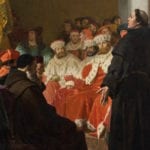Around the evangelical world, and especially in North America, the topic of worship has begun to grip us in new ways. Of course, publishers are always looking for books to sell that take a different approach to an issue in ministry, but maybe there is something more to it than that. Perhaps evangelicals have begun to realise that believers in the pews need greater depth and have begun to see that Sunday worship (with all its corporate aspects) has been missing from our individualistic lives.
Perhaps evangelicals have begun to realise that Sunday worship (with all its corporate aspects) has been missing from our individualistic lives.
Whatever the cause, it has been great to observe the new willingness to consider the pastoral and theological foundations of Sunday worship.[1] It has also been encouraging to see this interest reflected in recent publications such as …
- Worship Frames by Deborah Kapp, that introduces us to the framing of elements of a service, and especially the importance of segues;
- Rhythms of Grace by Mike Cosper, which asks how worship tells the story of the gospel;
- Zac Hicks’ The Worship Pastor, which offers a series of creative metaphors to help church leaders understand their roles.
But concerns with how evangelical Christians think about worship are not recent. John Stott captured the moment when he wrote in The Contemporary Christian (1995):
[W]e who call ourselves ‘evangelical’ do not know much how to worship. Evangelism is our speciality, not worship … We do not bow down before him in awe and wonder. Our tendency is to be cocky, flippant and proud. We take little time to prepare our worship services. Sometimes they are slovenly, mechanical, perfunctory and dull. At other time they are frivolous to the point of irreverence. No wonder those seeking Reality often pass us by!
It is surprising that there is so little written on how Stott understood Sunday worship. He didn’t write a book on it, but he did write lots about it nonetheless.
Here are some things I have learned from reading his proposed remedies:
1. Worship is part of basic discipleship
When I meet with a young Christian to talk about their new life in Christ, there are a number of things on the agenda. I want them to grow in assurance of sins forgiven. I also want to see their lives reshaped to include Bible reading, praying, giving and churchgoing.
But Stott made it a priority to teach young believers a theology of why and how we worship. After the Billy Graham mission to England in the 1950s, Stott contributed to a new magazine produced to provide basic discipleship for those newly converted. In the very first issue, he had this to say:
There are today literally thousands of such people who have been brought into a new and transforming experience of the power of Christ as a direct result of Billy Graham’s ministry. They stand on the threshold of the Christian life. They have taken the first vital steps with Christ, but they want to know how to go on with the Lord … to learn more about the Bible and the great doctrines of the faith … to have a stronger hold upon the principles of Christian worship and discipleship … to be equipped for the service of the gospel in the world.
For Stott here, understanding what we do in church is basic, foundational, necessary, and urgent—something new Christians need to get right. This is partly because the kinds of things I want a new Christian to grasp are actually reinforced in the very elements of a church service; partly because church is God’s way of teaching, training, and tethering us to his will and ways.
How important it is for young Christians to discover the assurance that can come through such corporate worship!
2. Worship sets the direction of a church
But Stott didn’t just see Sunday worship as an opportunity to train new Christians. He invested great energy in debating the nature of worship with other Anglicans, as well as those in different denominations. He spoke about worship, not just to new Christians but to leaders in the Church of England.
Stott invested great energy in debating the nature of worship … not just with new Christians but to leaders in the Church of England.
He did this because he recognised the profound ways our corporate worship can steer the church in healthy or unhealthy directions. For example:
- if we fail to engage the psalms in our worship, we risk skewing the content of the songs we compose away from God’s agenda;
- if we are not careful in celebrating the Lord’s Supper, we might just get its meaning and significance from one Bible passage like 1 Corinthians 11 rather than from all the Bible passages that teach about it;
- if our services only permit the staff of a church to offer ministry from the platform, we are making a statement about who can do ministry.
3. Worship can be a gospel issue
Stott understood that many of the battles of the Reformation concerned the nature of worship. He noticed how the Reformers deliberately nailed their theological flags to the liturgical mast! Thus, every year on the anniversary of his commencement at All Souls’ Langham Place, Stott would read out loud the 39 Articles of the Church of England in a service of worship. On such an important occasion as the 150th anniversary of All Souls’, he named reformed worship as one of his great burdens for the church’s future:
I have a dream of a church which is a worshipping church—whose people come together to meet God and worship him, who know God is always in their midst and who bow down before him in great humility.
(Schroder John Stott: A Summary of his Teaching, 65).
Many debates about what the Cross achieved express themselves in how we understand what sacrifice means in Sunday worship (c.f. Heb 13:15). Stott appealed to Archbishop Cranmer to show how reformed thinking about the Lord’s Supper distinguished two kinds of sacrifice:
Scripture undergirds Cranmer’s doctrine, both in safeguarding the uniqueness of Christ’s sacrifice and in defining our sacrifices as expressing our thanksgiving, not securing God’s favour.
(The Cross of Christ, 262.)
If we get wrong our worship at this point, we lose the Reformation’s precious discovery of free grace.
4. Worship has a role in evangelism
Stott believed that what we include in Sunday worship says something about our priorities as a church, and this meant (i) that regular Sunday church services should include an evangelistic element and (ii) that guest services should include aspects of regular worship.
The first ensured that evangelism wasn’t left to specialised ministries on university campuses or to Anglican societies. The second made sure that outsiders would know what to expect if they became Christians.
5. Worship and the ministry of song
Stott’s commitment to keeping evangelism and worship together reflected his knowledge of history. He was aware of how worship had enabled mission in the sixteenth century when the Scriptures and services were translated into the vernacular and in the eighteenth century when lively worship had provided an antidote to a rationalistic and nominal church. The evangelicalism that emerged from the eighteenth century was born singing!
In one early work, Stott tried to explain how Christians generally and Anglicans, in particular, are committed to the ministry of song:
Christian worship would be almost inconceivable without singing. During the service of Morning Prayer, for instance, the average Anglican congregation sings at least seven times—three hymns, three canticles, and a psalm. The familiarity of this fact should not conceal its significance. Singing is a distinctive feature of Christian worship.
(The Canticles and Selected Psalms, 9)
Worship Around the World
Stott’s worldwide ministry gave him many opportunities to participate in different kinds of worship in different churches and settings: from the Canadian Arctic to an Australian Cathedral. Whenever he met fellow evangelicals, Stott found it deeply refreshing and unifying to join together in worship with them. He was prepared to find common ground in a common experience of meeting with the Lord.
Stott found it deeply refreshing and unifying to join together in worship with fellow evangelicals.
Stott’s writings, whether commentaries, theology texts, or devotional material, have provided focus and steadiness to evangelical believers in this fearful and divisive nuclear age, holding truths in trust for Christians who were distracted or neglectful. His thoughtful approach to worship served the same end. Whether teaching young believers, challenging crusty bishops, or uniting the worldwide evangelical fellowship, worship was never far from his mind nor from his experience:
It is when we worship God, glorying in his holy name, that we are driven out to proclaim his name to the world.
(The Message of Romans, 379).
I am so glad that it is on the agenda again for many Christians today too.
[1] Note that I am using ‘worship’ here, like Stott, as shorthand for everything that Christians do together when they gather—and particularly those things that relate to our Godward acts of prayer and praise. The contested question of whether we should find another word for these, given the everyday connotations of ‘worship’ in Romans 12:1, is for another time.















